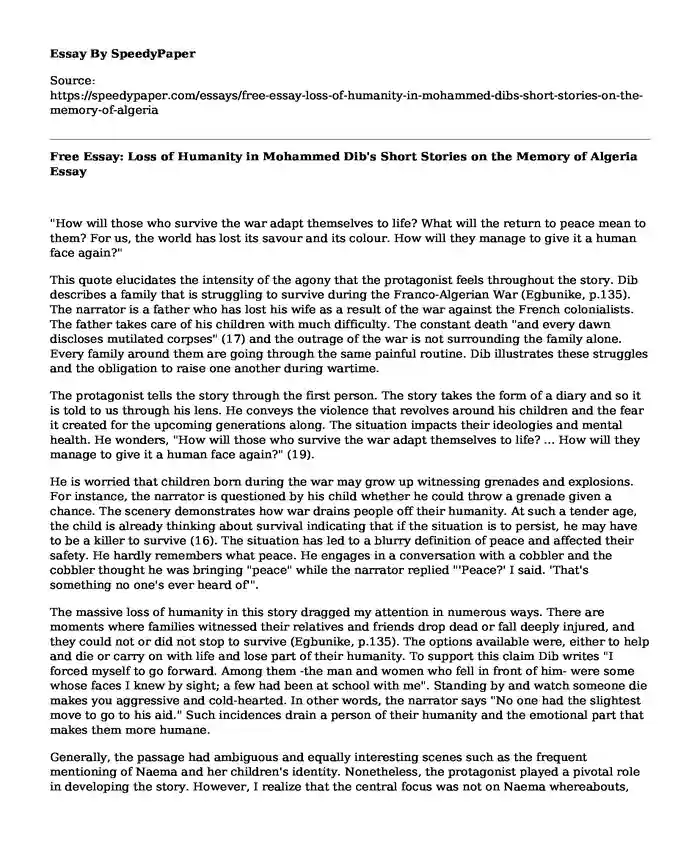
| Type of paper: | Essay |
| Categories: | Literature War |
| Pages: | 3 |
| Wordcount: | 620 words |
"How will those who survive the war adapt themselves to life? What will the return to peace mean to them? For us, the world has lost its savour and its colour. How will they manage to give it a human face again?"
This quote elucidates the intensity of the agony that the protagonist feels throughout the story. Dib describes a family that is struggling to survive during the Franco-Algerian War (Egbunike, p.135). The narrator is a father who has lost his wife as a result of the war against the French colonialists. The father takes care of his children with much difficulty. The constant death "and every dawn discloses mutilated corpses" (17) and the outrage of the war is not surrounding the family alone. Every family around them are going through the same painful routine. Dib illustrates these struggles and the obligation to raise one another during wartime.
The protagonist tells the story through the first person. The story takes the form of a diary and so it is told to us through his lens. He conveys the violence that revolves around his children and the fear it created for the upcoming generations along. The situation impacts their ideologies and mental health. He wonders, "How will those who survive the war adapt themselves to life? ... How will they manage to give it a human face again?" (19).
He is worried that children born during the war may grow up witnessing grenades and explosions. For instance, the narrator is questioned by his child whether he could throw a grenade given a chance. The scenery demonstrates how war drains people off their humanity. At such a tender age, the child is already thinking about survival indicating that if the situation is to persist, he may have to be a killer to survive (16). The situation has led to a blurry definition of peace and affected their safety. He hardly remembers what peace. He engages in a conversation with a cobbler and the cobbler thought he was bringing "peace" while the narrator replied "'Peace?' I said. 'That's something no one's ever heard of'".
The massive loss of humanity in this story dragged my attention in numerous ways. There are moments where families witnessed their relatives and friends drop dead or fall deeply injured, and they could not or did not stop to survive (Egbunike, p.135). The options available were, either to help and die or carry on with life and lose part of their humanity. To support this claim Dib writes "I forced myself to go forward. Among them -the man and women who fell in front of him- were some whose faces I knew by sight; a few had been at school with me". Standing by and watch someone die makes you aggressive and cold-hearted. In other words, the narrator says "No one had the slightest move to go to his aid." Such incidences drain a person of their humanity and the emotional part that makes them more humane.
Generally, the passage had ambiguous and equally interesting scenes such as the frequent mentioning of Naema and her children's identity. Nonetheless, the protagonist played a pivotal role in developing the story. However, I realize that the central focus was not on Naema whereabouts, but the constant violence caused by the war. The violence tore apart the humane aspect of those in the combat zone progressively. What remains questionable is, why was Naema prisoned? Does that also reflect on the children's future? Or does that leave the children with a vacuum within them? Is the narrator in denial? Will he find solace through acceptance?
Work Cited
Egbunike, Louise Uchum. "Mohammed Dib's Short Stories on the Memory of Algeria." Writing Africa in the Short Story 31 (2013): 135.
Cite this page
Free Essay: Loss of Humanity in Mohammed Dib's Short Stories on the Memory of Algeria. (2022, Nov 07). Retrieved from https://speedypaper.net/essays/free-essay-loss-of-humanity-in-mohammed-dibs-short-stories-on-the-memory-of-algeria
Request Removal
If you are the original author of this essay and no longer wish to have it published on the SpeedyPaper website, please click below to request its removal:
- The Action in Glaspell's Play Trifles. Free Essay Sample.
- A Literary Essay Example: Struggles of Women in the Trifles
- Essay Example: Leadership versus Management
- Essay Sample: Usefulness of Group Dynamics to Modern Organizations Leaders
- Criminal Procedure Essay Sample: Arrest Warrant vs. Search Warrant
- Free Essay Example Describing the Travel Ad
- Free Essay Example on Marketing and Communication Plan
Popular categories




